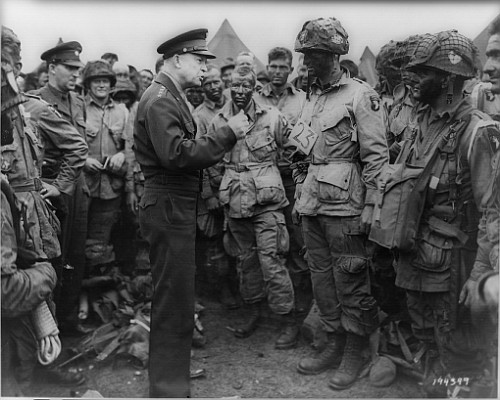Too good not to share…

Every gun that is made, every warship launched, every rocket fired signifies, in the final sense, a theft from those who hunger and are not fed, those who are cold and are not clothed. This world in arms is not spending money alone. It is spending the sweat of its laborers, the genius of its scientists, the hopes of its children. The cost of one modern heavy bomber is this: a modern brick school in more than 30 cities. It is two electric power plants, each serving a town of 60,000 population. It is two fine, fully equipped hospitals. It is some fifty miles of concrete pavement. We pay for a single fighter plane with a half million bushels of wheat. We pay for a single destroyer with new homes that could have housed more than 8,000 people. This is, I repeat, the best way of life to be found on the road the world has been taking. This is not a way of life at all, in any true sense. Under the cloud of threatening war, it is humanity hanging from a cross of iron. […] Is there no other way the world may live?
(Via Harpers.org | HT Steve Burleson)
What do you think?
This argument could be used anytime you do anything, that the money could be used to feed and cloth the needy. For example eating beef requires 5.5 to 6.5 pounds of corn per pound of eatable beef. (Some estimates go as high a 20 to 1, assuming an all grain fed steer). Therefore by becoming a vegetarian, I could fed 5 or more people grain instead of just me eating beef.
However, I would like to suggest that the real issue is getting the needy folks to produce something that others are will to pay for; either a service (i.e. moving lawns) or a product (mouse traps). The real problem is that most needy folks do NOT have the skills or resources to produce anything that we consumers are willing to shell out our hard earned money in exchange for.
What is needed is job training skills and capital to create new factories. This sounds easy, but the really hard part is job training for jobs that are needed (i.e. we don’t need any more lawn mowers) and factories that product something that we want and can afford (we don’t need any more $5.00 mouse traps).
Dismantling our national defense would not feed or cloth anyone and would likely subject all Americans (and most of the free world) to subjection (aka slavery). Creating more needy folks, not less.
May I suggest that the biggest hinderence to this corruption. The root of corruption is selfishness. If humankind could change their heart attitude from selfishness to the “Golden Rule” most of the needy would be clothed and feed without charity. Humankind needs God of the Bible!
Ken I agree that the root of the problem is selfishness – and I would agree that humanity needs a heart change that can only take place through a relationship with Yahweh.
But I also believe that as Christians we should be the hardest people in the world to convince that violence is necessary – not the people beating the war drums and calling for executions – we follow a Jesus who looked in the face of evil and said “forgive them for they know not what they do”
We should also be the ones who seriously examine what we’re buying and supporting with our wallets and our votes.
Do I really need to eat as much beef as most Americans? Do I really need to eat as much meat as most Americans, knowing that millions around the world live on rice and beans?
Do I really need to drive my car as often as I do, knowing that millions don’t even own a car and every gallon I consume, adds additional demand on our limited supply?
Do I really need bottled water, when 1 in 8 people around the world don’t even have access to clean drinking water?
Dismantling our national defense could easily feed and clothe thousands (if not millions) if the decisions were made to re-direct the funds. The problem is that so often decisions are made and never followed through (i.e. corruption). But the money could also easily be used for education (like you suggest) and training to help folks better provide for themselves.
There’s an amazing program a friend of mine is working with at an orphanage in Mexico. A guy from Duncanville has been developing a system in which he raises tilapia in shallow tanks and then uses the waste matter from the tilapia to fertilize gardens that grow over the tanks. With just a few tanks, the orphanage is able to feed all the children in the orphanage as well as sell a decent portion in the local village.
These are ideas that can easily be taken worldwide with proper funding and can actually save lives, rather than ending them.